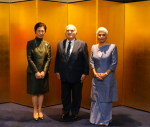You are here
What the closure of the US consulate in East Jerusalem means
Oct 22,2018 - Last updated at Oct 22,2018
This month's prize for dangerous moves and disingenuous press releases goes to the US State Department for its October 18 notice, headlined "On the Merging of US Embassy Jerusalem and US Consulate General Jerusalem". The release was a statement by Secretary of State Michael Pompeo announcing that the US consulate in East Jerusalem was being closed and its functions were being transferred to the US embassy in Jerusalem — that was the dangerous part. The disingenuous part was the secretary's claim that this move had no political meaning since it was merely a cost-saving measure.
Here is the beginning of the release: "I am pleased to announce that following the May 14 opening of the US embassy in Jerusalem, we plan to achieve significant efficiencies and increase our effectiveness by merging US Embassy Jerusalem and US Consulate General Jerusalem into a single diplomatic mission. I have asked our ambassador to Israel, David Friedman, to guide the merger.
"We will continue to conduct a full range of reporting, outreach and programming in the West Bank and Gaza as well as with Palestinians in Jerusalem through a new Palestinian Affairs Unit inside US Embassy Jerusalem. That unit will operate from our Agron Road site in Jerusalem.
"This decision is driven by our global efforts to improve the efficiency and effectiveness of our operations. It does not signal a change of US policy on Jerusalem, the West Bank or the Gaza Strip. As the president proclaimed in December of last year, the United States continues to take no position on final status issues, including boundaries or borders. The specific boundaries of Israeli sovereignty in Jerusalem are subject to final status negotiations between the parties."
There is so much that is wrong and misleading with this announcement that I scarcely know where to begin in critiquing it. But let me start with the claim that this is just an effort to "improve the efficiency and effectiveness of our operations".
Surely the secretary must know that the Jerusalem consulate is not just another consular office. As for the "functions" described in the statement — namely, "reporting, outreach and programming" — missing is the historic role that the consul general played as the official point of contact between the Palestinians in the occupied territories and the US government. The US embassy in Tel Aviv dealt with Israel and Israeli affairs, while the consulate served as the "de facto embassy to the Palestinians". Even in difficult times, the US consul general and the consulate remained open to receiving Palestinians and hearing their concerns. It has been the sole point of contact for Palestinians (and, I might add, for visiting Palestinian-Americans) seeking assistance from the US government. Now Palestinians are left with the US embassy in Israel as the sole American address in their region.
It has been difficult enough for Palestinians to secure a permit from the Israeli occupation authority allowing them access to the consulate's current East Jerusalem location. Visiting the embassy in West Jerusalem will be even more problematic. This guarantees that ordinary Palestinians will, for all intents and purposes, no longer have contact with official US representatives. Seen in this light, the move is bigger and more serious than a matter of "efficiency". One might suggest that if that were in fact the concern, why did the US not close its consulate in Haifa?
Closing the East Jerusalem consulate and moving its "functions" to the US embassy to Israel tells Palestinians that the US no longer sees them as a separate people deserving of their own direct access to the US. This is in line with a host of other recent US moves, which add up to denying independent peoplehood and self-determination to Palestinians. (These US actions include: questioning the "legitimacy" of Palestinian refugees and cutting all US assistance to them, ordering the closure of the Palestine Office in Washington, and acquiescence to Israel's "Jewish Nation-State" law which declares that only the Jewish people have the right to self-determination in the "land of Israel".) What closing the consulate in East Jerusalem says to Palestinians is that they are not seen by the US as a separate people but as a "minority community" whose interests are of secondary importance to those of Israel.
It is also not believable for the secretary to claim that this move "does not signify a change of US policy on Jerusalem... [or] the specific boundaries of Israeli sovereignty in Jerusalem". For decades, the US claimed that by maintaining a consulate in East Jerusalem, the US was sending the message that it continued to recognise that portion of the city was occupied territory. It is important to note that United States Ambassador to Israel David Friedman has been shaping US policy on this issue ever since he assumed his post. He has ordered that the Palestinian territories no longer be referred to as "occupied" and recent State Department publications reflect this. It is also important to note that the press statement making the announcement about the move makes no mention of "East Jerusalem", as if in Friedman's and the State Department's new lexicon the city is already one and it is Israeli.
It is also disingenuous for the secretary to claim that the US "takes no position on... borders" because, as a result of US sins of commission and omission, they have allowed Israel to determine the shape of the map of Jerusalem and the rest of the occupied territories. Cutting all US assistance to Palestinian hospitals and other institutions in East Jerusalem, acquiescing to Israel's prohibition on any meetings between US officials and Palestinian officials in East Jerusalem and US silence in the face of aggressive Israeli annexationist policies in and around Jerusalem, the construction of the separation wall denying Palestinian access to the city, the demolition of Palestinian homes and the construction of Israeli settlements positioned to strangle Palestinian life in Jerusalem, all have contributed to giving Israel carte blanche to shape the future borders of the city on their terms.
For years, supporters of a two-state solution to the Israeli/Palestinian conflict have been warning that we are "five minutes before midnight". Recent actions by the Trump administration have firmly moved us well past midnight.
Maybe, to be perfectly honest, the sign the US places over its Jerusalem embassy should read "Welcome to the One State Solution", because that is what we now have. And, by the way, it is an apartheid state and the US has aided and abetted its creation.
The writer is president of the Washington-based Arab American Institute













